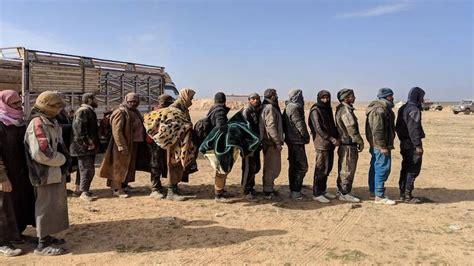
“His Life Is in Danger”: ISIS Leader Asking for Repatriation in France
“He is undoubtedly one of the highest-ranking living dignitaries of the Islamic State,” his lawyer says.
One of the high dignitaries of the Islamic State, a French national, has been held prisoner by the Kurds in northern Syria since 2018. Believing his life to be in danger, he has asked to be repatriated to France, which has created controversy: it was in fact through him that the French learned of Daesh’s involvement in two terrorist attacks on French soil.
The man was born Adrien Guihal on the French civil register, but for the Islamic State, he goes by the name Abu Oussama al-Faransi. Aged 40, he converted to radical Islam in 2002. In 2008, he took part in an attempted terrorist attack on the headquarters of the French intelligence service, foiled by the French authorities, earning him a prison sentence. Released in 2012, he then worked in a car garage reputed to be a haunt of jihadists. He travelled to Syria in 2015. Three years later, he was captured by Kurdish forces in Raqqa, then the short-lived capital of the Islamic State. He has since been imprisoned in northeastern Syria.
His mother is behind his request for repatriation. She believes that his safety is no longer assured and that he is in danger there. The request has been submitted to the French authorities several times since December 2022. The Ministry of Foreign Affairs and the Administrative Court of Paris have already opposed it. This time, Guihal’s mother intends to appeal to the Administrative Court of Appeal of Paris. On Wednesday, February 12th, Étienne Mangeot, the terrorist’s lawyer, filed the case with the court, aiming to force France to repatriate him. Two other families have joined the appeal.
Other French nationals fighting for the Islamic State are in the same situation. According to Mangeot, 65 French nationals are being held with Guihal in Derik prison, which is in the hands of Kurdish forces, in extremely difficult conditions that “place them in real danger of death.”
But Adrien Guihal is not just another Islamist. “He is undoubtedly one of the highest-ranking living dignitaries of the Islamic State,” admits Mangeot. Since his departure for Syria in 2015, Guihal has been the subject of an international arrest warrant. There, he worked in the communications department of the Islamic State. In 2016, the day after the attack in Nice, it was his voice that the French heard in the audio recording, claiming responsibility for the terrorist attack that left 86 people dead on the 14th of July, France’s national holiday. A month earlier, he also claimed responsibility for the murder of a police couple in Magnanville, a suburb of Paris, who were savagely stabbed to death in front of their three-year-old boy.
For the lawyer, it would be more “reassuring” today to know that Guihal is in prison in France and will be tried there, rather than potentially “on the loose” and being picked up by one or other of the Islamist groups still active in Syria. But this point of view is not shared by the French Foreign Ministry, which believes that, since the fall of the IS regime, people accused of complicity with the Islamic State should be tried locally. Mangeot would like the French courts to “have the last word,” and emphasises that Guihal and his accomplices are currently being held outside any legal framework, with no reaction from France: “I find that very unfortunate and a bit serious for the democracy that we are,” he told the press.
Overall, the majority of French people say they are against French jihadists returning to French soil. Imam Chalghoumi, known for his moderate stance, addressed the Minister of Justice and the Minister of the Interior on X to ask them not to give in:
No to the return of terrorists to France! Adrien Guihal, one of the highest-ranking French Daesh dignitaries, whose voice claimed responsibility for the Nice and Magnanville attacks, is demanding his repatriation. He is an absolute danger to our security! Radicalism is already a threat on our soil. Sending him back to prison here is to offer an opportunity for others to recruit him. This is a terrorist strategy that we must firmly reject! I call on our politicians to categorically oppose this return.
Between 2022 and 2023, France only repatriated women and children, before ceasing all operations of this kind, provoking several international condemnations, including that of the European Court of Human Rights in 2022.
Source » europeanconservative.com





